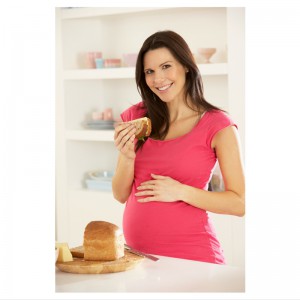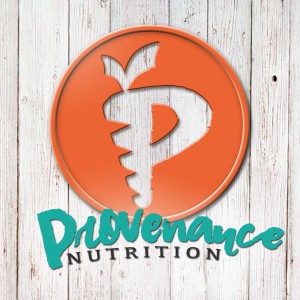The pregnancy test is positive! You’re having a baby! Yay! And then you read ALL the books. You eat more green vegetables than you have in your life. You take your prenatal supplement religiously. You even stop drinking coffee (even though you really really love your one cup a day.) Because – it’s not just you at stake anymore – there’s the baby to think of. It’s not surprising, in the midst of this massive life change, that you forget that when you’re “eating for two” – you are also eating for you.
And once that adorable new tiny human makes their appearance – all wrinkled and enchanting in their newness – it becomes even harder. Because babies are adorable, but damn newborns are a lot of work! So you eat what you can when you can… same goes for sleep… and you focus on helping your new little one adjust to the world and thrive. Your body will be fine – this is what it’s meant to do right?!
Well, yes. But not always. And not even most of the time. More and more women seem to be struggling—hormonally, nutritionally, and emotionally—to get back on their feet after the baby comes. And it’s not just because being a parent is difficult. Or that you’re just not hard core enough to rock this new parent thing! Post-natal depletion is a very real phenomenon. Feelings of anxiety, depression, fatigue, hypervigilance, isolation, frustration, overwhelm, apprehension, loss of libido, a sense of guilt and shame around the role of motherhood and a loss of self-esteem are all characteristics of post-natal depletion. A huge part of coping with new parenthood is absolutely whether or not you have a fabulous support system. But that’s only one piece of the puzzle – because physically, the process of growing a baby exacts an enormous toll on your body. And this is even before you add breastfeeding into the mix!

Did you know that the placenta passes nearly 7 grams of fat a day to the growing baby at the end of your pregnancy term? The placenta also taps into your iron, zinc, Vitamin B12, Vitamin B9, iodine, and selenium stores—along with omega 3 fats like DHA and specific amino acids from proteins. On average, a mom’s brain shrinks 5% during pregnancy, as it supports the growth of the baby (much of the brain is fat) and is actually rewired and re-engineered for parenthood.
Let’s sit with that for a minute. Your brain shrinks as part of the incredible process of creating the new tiny human. Your stores of key vitamins and minerals are depleted including the ones integral for managing fatigue, thyroid issues, anxiety/depression, immune function, and healing. This is the core of what causes post-natal depletion. Most of the so-called primitive cultures or first people of the world had very specific practices to ensure that mothers made a full recovery from childbirth. From China to India, from Aboriginal Australia to the Americas, for most of human history, there have been centuries of very deliberate practices in nutritional recovery, spiritual cleansing, and protection as well as elaborate social supports.
But North American society today doesn’t talk much about this anymore. We expect our new mums to bounce back to their former selves, master all the aspects of newborn care and breastfeeding – all with a minimal amount of outside help or guidance. Well, that’s just crazy pants! Post-partum recovery requires deliberate, thoughtful support including nutritional support with a focus on very specific micronutrients. You need to replenish all that you surrendered during pregnancy to the growing babe.
So I hear what you’re thinking… this post-natal depletion thing isn’t going to happen to me. I am healthy and active. I eat well and I have paid careful attention to the most important supplements for pregnancy. And maybe you will be just fine! If so, rock on! But keep in mind that healthy, active women can also experience post-natal depletion to a certain degree particularly if you are going into your second or third pregnancy. Post-natal depletion can affect you even years after the birth of your children and can play a big role in secondary infertility (difficulty conceiving the 2nd or later child). Why is this?

Because many women are going into pregnancies with existing vitamin and mineral deficiencies (not realizing it) due to the fact that our food just not contain the nutrients it once did. You can eat a varied, mostly organic whole foods diet and still have deficiencies. Because many factors including sleep quantity (and quality) and stress levels affect our bodies ability to absorb and store nutrients. Many women are going to pregnancy tapped out, stressed out and already running on empty. And thanks to biological design – your body is always going to prioritize the baby. So for example, if your calcium stores are low – your body will pull calcium from your bones to nourish the growing baby. Awesome for the new tiny human. Not to awesome for your body.
Plus, while we still don’t totally understand how or to what extent, environmental pollutants like air pollution, heavy metals, chlorinated water, endocrine disruptors (like BPA, artificial fragrance etc) which are present in cleaning products, body care products all affect our body’s ability to function. Add all these environmental stressors to a body already struggling to support the new tiny human? What you get is a very depleted post-partum body even if you are doing everything “right”.
So what can you do to help nourish your body and help it replenish and recover? Keep these 2 key recommendations in mind…
- Get support. And then get more support! Caring for a newborn was never supposed to be a one-woman show! Let that friend/family member do your dishes. Fold laundry. Hold the babe so you can take a blessed shower. But also ask your mother/brother/friends/uncles to cook for you! Ideally, food that freezes well and can be eaten with one hand. Your support system not really into the cooking? Give them easy recipes. In the last few weeks of pregnancy, when you’re finally forced to take it easy because walking has definitely become waddling– put together half a dozen recipes that sound good. It might sound bossy – but the people who love you will want to help – so give them a way of doing so! And the food does not have to be anything fancy just whole foods based meals – soups and stews are always a good bet. Look for recipes that contain the following foods and key micronutrients:
- Iron – naturally raised chicken, grass fed beef, blackstrap molasses, pumpkin and sunflower seeds, beans, nettles, amaranth, dark leafy greens and fresh apricots
- Zinc – steak, shrimp, beans, raw organic nuts, sea salt, sea vegetables (like nori, kelp, kombu, dulse)
- Vitamin B12 – eggs, wild caught salmon, liver, naturally raised chicken, grass fed beef
- Vitamin B9 (Folate) – dark leafy greens, asparagus, broccoli, citrus fruits, avocado, okra, Brussel sprouts, nuts/seeds
- Iodine – see the list of sea vegetables mentioned above!
- Selenium – brazil nuts, eggs, sunflower seeds, beef liver, chicken, chia seeds, wild caught salmon
- Probiotic foods – fermented foods like sauerkraut, kombucha, pickles, kefir, kimchi
- Supplement! I am a food-first nutritionist and I will always recommend that we look to food to help support any healing or rebalancing that needs to take place. But there are times where it’s tough to get all the ideal nutrient-dense foods into your belly as often as you should. This is when supplementation can play an enormous role and the post-partum period is exactly one of those times! Always consult your nutritionist or naturopathic doctor to determine which supplements are best for you but these are some ideas of where to start…
- Probiotics – Everything starts in our gut. Including healing! So make sure there are lots of good bacteria where they should be! Always make sure to buy probiotics from the refrigerated section of your health food store.
- DHA/EPA supplement – This comes in the form of fish oil or if you don’t eat fish you can get the vegan form (from algae). You just handed over a huge amount of DHA to your new little one. You’re going to need to top up your levels!
- Vitamin D – Sufficient levels of the sunshine vitamin just makes everything easier! Often a DHA/EPA supplement will also come fortified with vitamin D and your prenatal may as well. Just make sure you are getting at least 1000 IUI a day (sometimes even higher dosages are recommended.)
- Pre-natal Supplement– Keep taking your prenatal and ensure that it is a professional or practitioner grade brand that specifically contains B vitamins in their active form as well as an easily absorbed form of iron.
- Nettle tea – This tea is very effective in boosting iron stores. The lack of sleep that comes with having a newborn will absolutely lead to fatigue – but low iron can make that fatigue crippling.
- Calcium/magnesium – both these minerals help your body have the best quality sleep possible – even if it is only for short periods of time through the day/night.
- Consider placenta encapsulation! There is no double blind placebo-controlled scientific study that will provide evidence that consuming the placenta helps a woman recover more quickly in the post-partum period. However, there is a significant amount of anecdotal evidence that suggests it can make a big difference in healing rates, mood stabilization and hormone balance, energy levels, lessening bleeding, increasing milk production, replenishing depleted iron stores and hastening the return of the uterus to a pre-pregnancy state. Many midwives, doulas, and nutritionists provide the encapsulation service which is quite reasonable at about $200. Check here for more information.
So the bottom line is – your body will not magically recover from the enormous experience of growing a baby and you can not expect it to! Are you a new mum and struggling with feelings of anxiety, depression, feeling “tired yet wired”, isolated, frustrated or just really overwhelmed? If the answer is yes to any of these – ask for help! You do not have to do this alone and you do not have to feel like that. There are very real physiological reasons for what you are feeling. Contact your medical doctor and I would also recommend checking in with a Nutritionist or Naturopathic Doctor to ensure that you’re getting all the nutrients/minerals that your body needs right now. Because post-natal depletion will affect the most kickass, organized and rockin’ women among us and it means your body needs some extra loving support right now. Not sure where to start? Send me a message and we can have a chat and figure it out together!

Jessie holds a Master’s degree in the “Politics of Food” for Queen’s University (food has always been her passion) and she became a practicing Registered Holistic Nutritionist to live that passion – to help get at the root cause of her clients’ health problems (as she had learned to overcome her own health challenges) and most importantly – to reintroduce the joy back into learning to make healthier food choices. The journey to improved nutrition is not about short-term deprivation – it is about long-term sustainable balance that is both empowering and joyful! Jessie’s practice includes clients with a wide range of digestive issues, weight loss goals and has a particular focus on fertility nutrition and women’s reproductive health. You can learn more about her practice by checking out her Facebook page or joining her free community Facebook group for nutrition and lifestyle tips on eating and living well!


Leave a Reply